Young Generation Reimagine AI

What purpose should artificial intelligence have and who should it serve? Young adults develop their vision for a future with artificial intelligence – a short film and selected statements.
A generation is growing up for whom life with artificial intelligence (AI) will not be a utopia, but a natural everyday experience. Today's political decisions on the use of new and digital technologies will have a profound impact on the lives of this generation. But so far, these young people have not been sufficiently involved in the making of these decisions.In the short film Envisions - Future Visions for Life with AI, young adults propose creative solutions to AI problems. And through short interviews, they reflect on personal attitudes and approaches. The short film and interviews were produced in the "Envisions" programme as part of a Goethe-Institut project called "Generation A=Algorithm" (More information on the Generation A=Algorithm project and the background to the film and interviews: below).
Video: “Envisions – Future Visions for a Life with AI”eben mit AI“
Andrew Mallinson
 Why do you deal with Artificial Intelligence? What is your particular interest in AI?
Why do you deal with Artificial Intelligence? What is your particular interest in AI?I began to work with AI after some time in the creative industry. During my education in Fine Art, I became interested in the ways in which bodies move politically and socially through space. In 2017, I was introduced to Feminist Internet, a collective of artists and designers tackling technological inequalities. I quickly understood that there was a space within my practice that I wasn’t considering, that being the way bodies move through technology. Since working with the collective I’ve become particularly interested in this slip between where the body exists in both a physical and digital reality and how the consequences of our actions move mutually between these spaces.
You facilitated three workshop for a group that worked on the envisioning of new futures for AI. What is your take away from the “Envisions” programme?
My biggest takeaway is that this generation is extremely impassioned about AI; they want to be able to make decisions, they are tired of private corporations and governments developing and making choices on AI that they deem to be undemocratic and harmful to people and the environment. Equally, I also have found a particular faith in the methodology of the workshops used during the Envisions process as a way of generating ideas and concrete solutions.
Please choose one statementfrom the “Envisions” film and tell us why it is important to speak about this topic when it comes to the future of AI?
“If we queered AI. We could create technologies that exist miles beyond our current understanding. We could fill technologies with queer joy. Queering AI makes the space for a multitude of perspectives.”
These statements speak to the imagination and hopefulness embedded within the Envisions process. Current models of AI development have led to countless issues around privacy, impacts on mental health, public safety, and many more. What could AI look like if agency was given to LGTBQ+ people to build something in their vision, something that benefited their communities? As we move into a time where the ‘metaverse’ is being considered perhaps we need to be thinking in tandem about what ‘queeerverse’ could look like?
Emilija Gagrčin
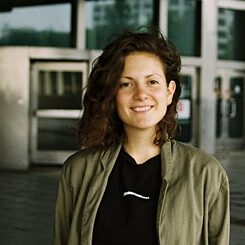 Why do you deal with Artificial Intelligence? What is your particular interest in AI?
Why do you deal with Artificial Intelligence? What is your particular interest in AI?I am interested in how technology shapes our civic and political lives. In many ways, the impact of AI is particularly challenging to assess. For example, social media algorithms are what some have called “experience technologies”: we do not necessarily notice them consciously but rather give in to their guidance—at least as long as they “work for us”. Similarly, AI based technologies are increasingly used in the background, without us noticing them, yet they do influence how we engage with the world.
Please choose one sentence from the “Envisions” film and tell us why it is important to speak about this topic when it comes to the future of AI?
I like the sentence: „We need to discuss AI like we discuss pop culture “. I understand it to mean that conversation about the use of AI technologies in society should become mainstream, something that everyone can talk about. Many people — including myself occasionally — think that you need to be an expert to discuss digital topics and partially, I believe that tech giants in fact like us to feel this way. But there are many ways to engage in these conversations in a more playful, less threatening and expertise-demanding way. In this regard, the interdisciplinary approach that the “Generation=A”-project took, was great because it encouraged discussions on the topic of AI and society from various standpoints in a way accessible to various audiences.
Elena Falomo
 Why do you deal with Artificial Intelligence? What is your particular interest in AI?
Why do you deal with Artificial Intelligence? What is your particular interest in AI?In my work I deal with AI because it is a pervasive technology that has been changing the way we behave as individuals, communities and as a society. The widespread implementation of AI has also raised many questions on the way we develop technology, the biases we embed in technology and how we handle its unintended consequences. Reflecting on these questions can bring us to reassess our values and propose new configurations for humanity to come together and act for the betterment of humanity and of the planet.
Please choose one statement from the “Envisions” film and tell us why it is important to speak about this topic when it comes to the future of AI?
“This is why AI has to be co-created, being built by communities, for communities, with communities.” The creation of technology is often exclusive to an elite, but impacts the life of everyone. We need to challenge this paradigm, we need to envision technology eco-systematically and involve the experiences of many if we want technology to have a positive impact on our society and planetary life.
Sinem Görücü
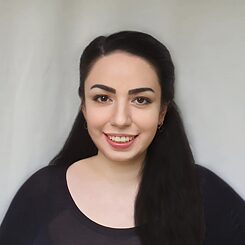 © Sinem Görücü
Why do you deal with Artificial Intelligence? What is your particular interest in AI?
© Sinem Görücü
Why do you deal with Artificial Intelligence? What is your particular interest in AI?I am specifically working at the intersections of AI, data, design and social justice as a researcher who was trained to be a designer and architect. What interests me the most are the social consequences of design decisions in algorithmic processes and how oppression, discrimination and inequalities are re-shaped by these technological developments.
What is your main take away from the “Envisions” programme?
When projecting futures and envisioning future developments, the most important consideration should always be to ensure that the people who are going to be the most challenged by these processes do not remain unheard or get passivized. I believe the Envisions programme provided us with a very creative and productive space to reflect on young people’s concerns regarding AI. We could address the central issue of how technology is and will be shaping and transforming our lives. Who is going to be left behind, who should be making the decisions and how can we ensure a common future for intersectional justice? And finally, how can we communicate all these visions?
Please choose one statement from the “Envisions” film and tell us why it is important to speak about this topic when it comes to the future of AI?
“AI has to learn and unlearn, just like you do.” This is the most important statement for me. From the moment we are born, we all learn how to hurt, how to bully each other, how to compete against each other to fit into the system, how to discriminate and marginalize each other based on whatever difference we discover and how to oppress each other for our own profit. We keep reproducing whatever we were taught by the human history and systems of oppressions - and AI is not different from us in that regard. It learns how to oppress in the same way we do and can thereby amplify the existing oppression. There is no way to achieve AI justice without achieving global justice and AI indeed has to unlearn oppression just like us.
András Cséfalvay
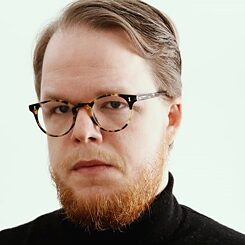 © András Cséfalvay
Why do you deal with Artificial Intelligence? What is your particular interest in AI?
© András Cséfalvay
Why do you deal with Artificial Intelligence? What is your particular interest in AI?From my childhood on, I have had a twofold fascination with technology. On the one hand, I am interested in what technology can do for me – increasing leisure and reducing work. At the same time I am afraid of the unknown, when it comes to technological development. And that is why I am trying to explore it to the greatest degree that it can be known: to have as much power as possible over it.
You took part in a workshop series that aimed to come up with visions of new futures for AI. What is your take away from the “Envisions” programme?
My main take away was that computer scientists do indeed need artists like myself. I had always hoped and suspected so, but the exchanges during the workshops deepened my belief that there is a great need for creative imagination when it comes to the development of technology.
Please choose one sentence from the “Envisions” film and tell us why it is important to speak about this topic when it comes to the future of AI?
"There is a power imbalance between people and corporations and governments." This imbalance is a great problem for me personally. If we could somehow address this imbalance than there are some possible techno-assisted-utopias. However, if this imbalance is not addressed, then the best technologies, including AI will always serve the needs of the few.
In November 2021 you were part of a travel group consisting of participants of the project “Generation A=Algorithm” and took part in the final event in Dresden, the festival “When Machines Dream the Future”. What was the most important outcome of this journey for you?
If you know how to use them, statistics are a great tool for modelling the world and measuring potential errors – especially when returning from the model to the real world. AI seems to bear a lot of similarities to multidimensional statistics in that regard. Yet what remains important is to be able to interpret the fringe, the queer, the minorities’ needs and voices, when the statistical average seems to show a way to effectivity and dominance. This was my main takeaway from panels on indigenous perspectives on AI and the dangers of facial recognition. I hope to build upon these insights in my own artistic practice in the future.
Nika Bakhsoliani
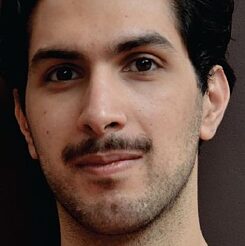 © Nika Bakhsoliani
Why do you deal with Artificial Intelligence? What is your particular interest in AI?
© Nika Bakhsoliani
Why do you deal with Artificial Intelligence? What is your particular interest in AI?I began to develop an interest in AI-related policies in the course of several scandals related to data misuse, in which AI had been suspected to be used to amplify negative effects on democratic discourses. My particular interest in AI, therefore, stems from a human rights activist's perspective. AI is thought to be a factor of rapid growth in development in number of areas and sciences, but it may also be misused against minorities and disadvantaged populations; enforcing predispositions which already exist. And that is why I think activists like myself should be on high alert, because technological development currently severely outpaces its civic monitoring.
Please choose one statement from the “Envisions” film and tell us why it is important to speak about this topic when it comes to the future of AI?
I would choose: "We need more awareness, we need transparency, we need education. We need to discuss these issues like we discuss pop culture. We need to decentralise power from governments and corporations and redistribute resources. We need to build towards a future that is anti-extraction. AI should propagate peace, not power. There’s so much potential for change." This statement addresses the need for education and a delegation of power back to the citizens, which as a goal is very close to my own professional and personal aspirations, pursuits and worldview. As someone who is engaged in human rights education for and with young people, I believe that ultimately, well-informed and empowered citizens have the possibility to exercise control over decision makers and big tech corporations.
Orfeas Menis-Mastromichalakis
 Why do you deal with Artificial Intelligence? What is your particular interest in AI?
Why do you deal with Artificial Intelligence? What is your particular interest in AI?Artificial Intelligence is a fascinating technology with the potential to change our world from its foundations. It’s amazing how algorithms already manage to outperform humans in complex tasks like image recognition. This fascination with its abilities originally sparked my interest in AI. Delving deeper, I learned more about its design, its applications in the real world and the moral, social, and ethical implications that it carries. I learned about the waste of resources that is an integral part of AI in our modern capitalist world, and how the structure of this technology can dangerous for our future. Rather than being a technology that could liberate the lower classes, AI is on its way to becoming another “weapon” in the hands of the “strong”; broadening the existing social and economic gaps in our societies. My particular interest lies in the exploration of systems that would guarantee an unbiased and fair application of AI. I hope to contribute to the use of AI for the good of everyone, ultimately aiming at the elimination of injustice and inequality in society
Please choose one sentence from the Envisions Film and tell us why it is important to speak about this topic when it comes to the future of AI?
While I do not think that an issue as complex as the future of AI can be discussed by focusing on one statement, I found a sentence that strongly reflects my own vision of the future of AI (and beyond): “We need to decentralize power from governments and corporations and redistribute resources.” This is a big claim – something that won’t happen within a few days or even years – but I strongly believe that the liberation of individuals and true freedom can only be achieved, if big corporations and governments don’t hold all the power over AI. The major problem with the current design of AI is that it is an extremely centralized technology. If we don’t find a way to decentralize it, we can’t expect it to be used for the greater good and to prevent the misuse of AI within systems of power inequality and oppression.
Valerie Wolf Gang
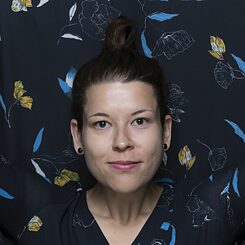 © Valerie Wolf Gang
Why do you deal with Artificial Intelligence? What is your particular interest in AI?
© Valerie Wolf Gang
Why do you deal with Artificial Intelligence? What is your particular interest in AI?I really enjoy to work at the intersection of science and art. I found AI inspiring to incorporate it in my projects because I really like to set up interactive works and love to observe the interaction of visitors with the artworks, which often creates new stories and adds additional elements to my own works. I also think that working with AI presents a great opportunity to develop further in the field of science and to inspire science itself with new and creative perspectives.
In which format of the “Generation A=Algorithm” project did you participate and what was the reason for you to take part in the project?
I was part of the AI Residency programme, which encouraged institutions and companies involved in AI to host young artists across Europe. My residency at the German Research Center for Artificial Intelligence (DFKI) in Saarbrücken was really inspiring, because I was able to collaborate with scientists and enjoyed the work with robotics and brain computer interfaces. The residency provided me with a scientific background and impacted a lot of my artworks, in which I aim to incorporate my recently acquired scientific knowledge.
You also took part in a workshop series that aimed to come up with visions of new futures for AI. What is your take away from the “Envisions” programme?
I really hope that AI will develop further in the sector of medicine and think that there could be a great benefit in incorporating creativity as well. My vision for the future is that we can merge artistic approaches and the field of medicine, since I believe that the creative industry and the culture sector would be able to develop unique solutions to some of the medical issues we face today.
Please choose one statement from the “Envisions” film and tell us why it is important to speak about this topic when it comes to the future of AI?
“We need more awareness, we need transparency, we need education, we need to discuss these issues like we discuss pop culture. We need to centralize power from governments and corporations and redistribute the resources. We need to build towards a future that's anti extraction. It should propagate peace, not power. There's so much potential for change.” I think this is an extremely important statement. And specifically, I would focus on the importance of education because I think that the first step to a better understanding of technology is a clear incorporation into governmental education programmes. I think we need to develop these programmes on a national, European and global level to ensure a better general understanding of AI. I think, education is a fundamental key to many of the questions that are constantly discussed in relation to AI.
Background
“How can we reimagine how we live with AI now? How do we want to live with it in the future? And what does AI look like when it actively seeks to challenge injustices?”
These are some of the key questions that the two-year project “Generation A=Algorithm” addressed together with a variety of partners and in the form of wide-ranging formats from hackathons, artist residencies and an online series of virtual “Couch Lessons”. The main focus of the project, however, was always on the future consequences of current technological developments on a generation of young people who are growing up in a world deeply affected by AI and other digital technologies, but thus far are underrepresented when it comes to the political decisions that inform this coming age of technology. To give this generation a voice within the process, the Goethe-Institut, in cooperation with Feminist Internet – a collective of artists and designers – organized a series of workshops that aimed at collectively developing a vision for a future with AI. 54 young adults from 16 European countries participated and contributed to the envisioning of futures that place agency in the hands of young people, reimagining the purpose of AI and who it is created to serve. Their backgrounds were as diverse as their approaches to technology, spanning researchers, artists, activists and policy advisers – each contributing unique viewpoints on a multifaceted issue. The result of their collaborative effort was the production of a vision paper and a short film that both propose creative solutions to problems within AI and provide tools for future decision-makers. The film was presented at the AI-Festival “When Machines Dream the Future”, organized by the Goethe-Institute in cooperation with the Deutsches Hygiene-Museum, Dresden in November 2022, which was also attended by a number of the young people involved in the creation process. In the interviews presented above, several of them reflect on their own approaches to AI, their involvement with the “Generation A=Algorithm” project and the “Envisions” programme in particular, as well as their personal visions for a future with AI.